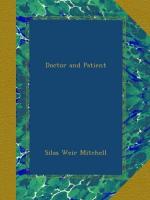To my mind, there is nothing more pleasant than the gradual return to health after some revolutionary disease which has removed a goodly portion of the material out of which is formed our bodily frame. Nature does this happy work deftly in most cases, where, at least, no grave organic mischief has been left by the malady; and in the process we get such pleasantness as comes always from the easy exercise of healthy function. The change from good to better day by day is in itself delightful, and if you have been so happy, when well, as to have loved and served many, now is the good time when bun and biscuit come back to you,—shapely loaves of tenderness and gracious service. Flowers and books, and folks good and cheery to talk to, arrive day after day, and have for you a new zest which they had not in fuller health. Old tastes return and mild delights become luxuries, as if the new tissues in nerve and brain were not sated, like those of the older body in which they are taking their places.
When you are acutely ill, the doctor is business-like and gravely kind; you want him in a way, are even anxious to see him for the relief he may bring, or the reassurance. But when you begin to feel as if you were a creature reborn, when you are safe and keenly enjoying the return of health, then it is that the morning visit is so delightful. You look for his coming and count on the daily chat. Should he chance to be what many of my medical brothers are,—educated, accomplished, with wide artistic and mental sympathies,—he brings a strong, breezy freshness of the outer world with him into the monastic life of the sick-room. One does not escape from being a patient because of being also a physician, and for my part I am glad to confess my sense of enjoyment in such visits, and how I have longed to keep my doctor at my side and to decoy him into a protracted stay. The convalescence he observes is for him, too, a pleasant thing. He has and should have pride in some distinct rescue, or in the fact that he has been able to stand by, with little interference, and see the disease run its normal course. I once watched a famous surgeon just after he had done a life-saving operation by dim candle-light. He stood smiling as the child’s breath came back, and kept nodding his head with pleasant sense of his own competence. He was most like a Newfoundland dog I once had the luck to see pull out a small child from the water and on to a raft. When we came up, the dog was wagging his tail and standing beside the child with sense of self-approval in every hair. The man wagged his head; the dog wagged his tail. Each liked well what he had done.
Thus it is that these half-hours by the convalescent’s couch are full of subtle flattery for the doctor, and are apt to evolve the social best of him, as he notes the daily gain in strength and color, and listens, a tranquil despot, to one’s pleas for this freedom or that indulgence. He turns over your books, suggests others, and, trained by a thousand such interviews, is likely enough a man interesting on many sides.




